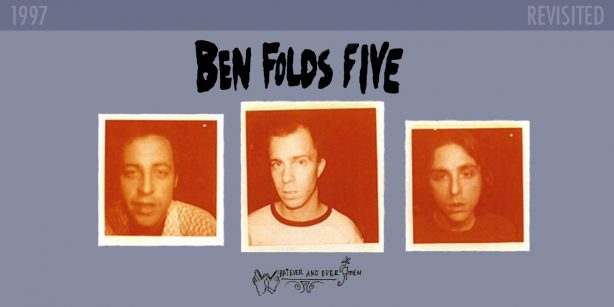 Music
Music
'Whatever and Ever Amen' cemented Ben Folds as an anti-rockstar success
by Rob Rousseau
February 16, 2017
We look at Ben Folds Five's seminal second album 20 years later and find that its unique brand of piano rock sounds as good as it ever did.
One common thread you inevitably discover when taking a focused look back on this particular era in music history – one we’ll mostly likely come back to repeatedly in 1997 Revisited – is that it was a time when several unique voices got an opportunity to make some noise on a mainstream platform that probably wouldn’t have been available to them in the years before or since. Some took their shot, enjoyed a brief stay among the pop culture elite and faded back into obscurity. Others, like bookish anti-rockstar Ben Folds, managed to translate their success into impressive, longstanding careers.
Really, Ben Folds Five had “one hit wonder” written all over them. A quirky, piano-based three-piece who found success on the back of a heartbreaking ballad that would play well in melodramatic montages in films and television shows, but didn’t really represent what the rest of the album or the band as a whole sounded like. That Ben Folds managed to avoid these pitfalls is a testament to his ability as a singer and songwriter, but it’s worth pointing out that even if “Brick,” a devastatingly frank depiction of the aftermath of an abortion that Folds and his then-partner lived through, had been his only breakthrough hit, it would still qualify as a tremendous musical achievement. It’s just that good of a song.
Thankfully for us all, Folds had plenty more tricks up his sleeve, and his versatility and incredible pop sensibilities are on full display throughout Whatever and Ever Amen. Follow-up single “Song For the Dumped” is a pretty sterling representation of the Ben Folds brand; the unassuming music nerd triumphantly dropping F-bombs while imploring his last love to “give me my money back, you bitch.” It’s a chorus that today would probably be unfairly decried as pablum for red pill, MRA alt-right man babies, but in 1997 it still felt ironic and refreshing. And really, Folds as a figure is just so uniquely unthreatening that it would be difficult even now to perceive any actual malice behind the harsh words.
“Kate,” a musical cousin to The Beatles’ “Lady Madonna,” has legitimate pop chops and again, acted as a perfect showcase for the character Ben Folds was projecting and has continued to refine over the years: an uncool music nerd without an ounce of the swaggering charm that one would typically associate with a rock & roll front man. He marvels at the titular character’s wild ways, singing “Everyday she wears the same thing / I think she smokes pot / She’s everything I want / She’s everything I’m not.” With the main hook of the chorus of “I wanna be Kate,” Folds makes clear that the object of his obsession is so unattainable that he doesn’t even dream of romancing her – he just wants to be as cool as she is. Again, this kind of Seth Cohen-type of awkward geek character has since become ubiquitous, but in 1997 it was still an incredibly fresh subversion of familiar rock tropes.
“Cigarette” nails some of the same melancholic notes that “Brick” utilized to massive success, but in a more understated way, like the sonic equivalent of a contemplative 4am moment after a night of excess. It also marks the first appearance of nebbish Foldsian protagonist Fred Jones, who would appear again a few years later in “Fred Jones Part 2” on his 2001 solo album Rockin The Suburbs. These types of characters appear elsewhere on the album (such as “Steven’s Last Night in Town”), and can be found throughout Folds’ body of work – providing him with avatars through which he can safely project his fears, doubts and insecurities, or conversely, allow him to express the rantings of his unrestrained id.
There are plenty of other gems on Whatever and Ever Amen. “Smoke,” with it’s gypsy-esque accordion accompaniment brings to mind a foreign café far away from the southern-fried Americana of Folds’s North Carolinian upbringing. “Battle of Who Could Care Less” provides Folds with another opportunity to exercise his Randy Newman/Billy Joel/Brian Wilson-styled piano pop sensibilities. The remastered version also contains a kickass cover of “Video Killed the Radio Star,” which has since become a staple in Folds’ live show.
—
Critics were kind to Whatever and Ever Amen, with Rolling Stone writing that he had “written another batch of sweet songs” that were supported with “disciplined, downright patient arrangements.” SPIN said the album provided the listener with “a rare opportunity to cheer for the largesse of corporate rock.” Although the album wasn’t exactly an iconic smash hit, it did provide a truly gifted songwriter and musician in Folds an opportunity to spread his music to the masses, and allowed him to build a successful career – from his solo work like Rockin The Suburbs and Songs for Silverman, to viral video success with a legendary improvised Chatroulette jam, to his reformation of Ben Folds Five in 2012, which led to the album The Sound of the Life of the Mind becoming Folds’ first Billboard top 10 hit. But perhaps Whatever and Ever Amen’s greatest pop culture contribution is the establishment of the geek-cool archetype which was unheard of at the time, but has since – for good or ill – become a major social trend that packs cinemas for Marvel or Star Wars sequels or allows bands like Death Cab for Cutie to sell out huge arenas.
Tags: Music, 1997 revisited, Ben Folds Five






